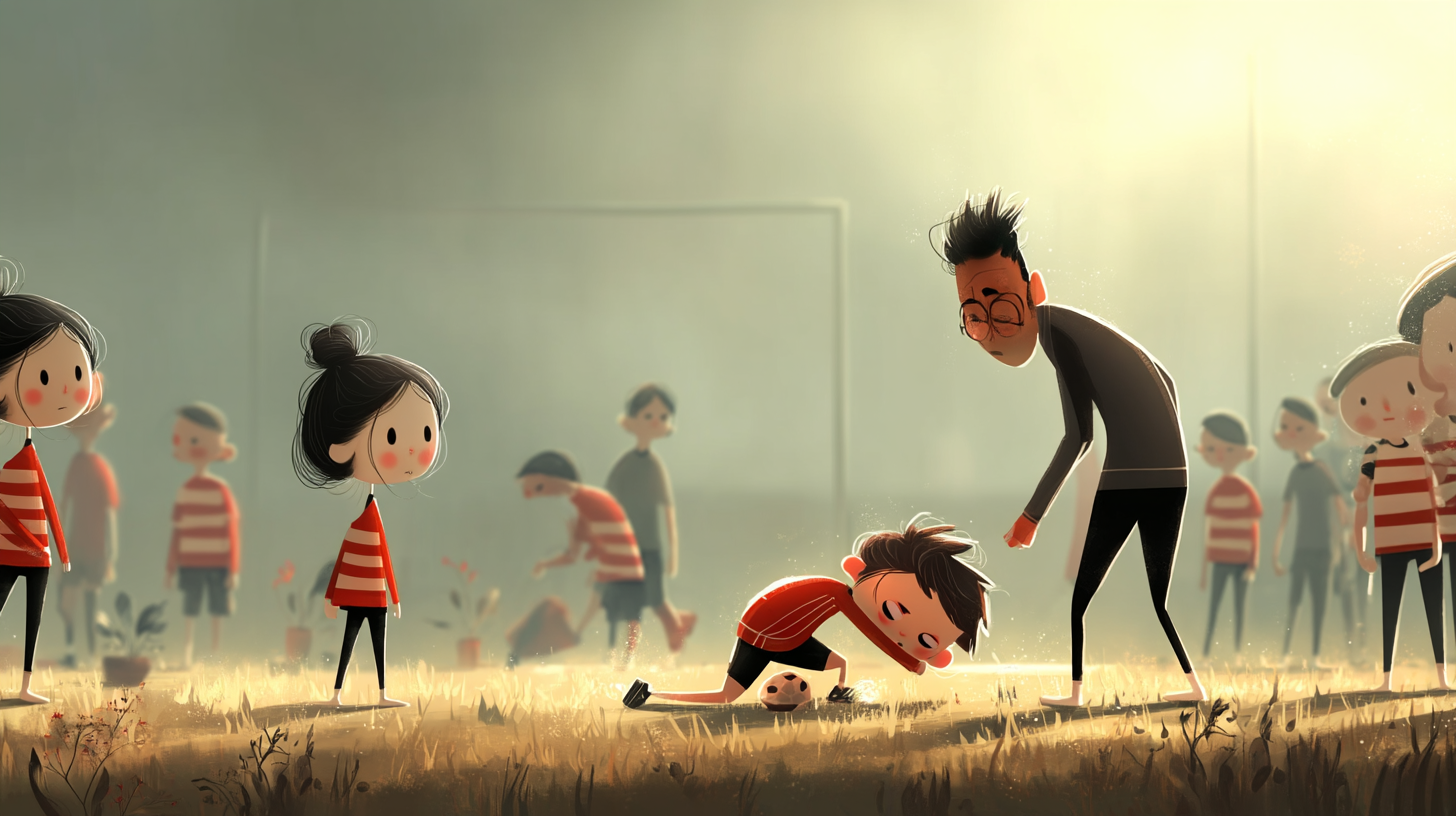“Injure” means to hurt someone’s body.
「injure」は、人や体をけがさせることを意味します。
以下は英単語 “injure” に関するストーリー型学習コンテンツです。まずは大枠の意味を理解して最後の文章で確認しましょう。
主な意味(main meaning)
| 品詞 | 意味 | 発音記号 | 英文例 |
|---|---|---|---|
| 動詞 | けがをさせる、傷つける | /ˈɪn.dʒər/ | He injured his leg while playing soccer. |
語源(etymology)
「injure」はラテン語「injuria(不正、害)」が語源です。「in-(否定)」+「jus(正義)」が組み合わさって「正しくないことをする=傷つける」というイメージです。
類義語(synonyms)
| 類義語 | 英文例 |
|---|---|
| hurt | She hurt her finger while cutting vegetables. |
| wound | The soldier was wounded in the battle. |
| damage | Smoking can damage your lungs. |
| harm | Too much sun can harm your skin. |
| bruise | He bruised his knee when he fell down. |
反義語(antonyms)
| 反義語 | 英文例 |
|---|---|
| heal | The doctor helped the patient heal quickly. |
| protect | A helmet protects your head from injury. |
コロケーション(collocations)
| コロケーション | 英文例 |
|---|---|
| injure someone badly | He injured his arm badly in the accident. |
| get injured | Many players got injured during the game. |
| be seriously injured | The driver was seriously injured in the crash. |
| injure oneself | She injured herself while skating. |
| injure a body part | He injured his back lifting a heavy box. |
2項表現(binomials)
| 2項表現 | 英文例 |
|---|---|
| aches and injuries | After the race, he had many aches and injuries. |
| bumps and bruises | Kids often get bumps and bruises while playing. |
英語ストーリー(english story)
Title: A Day at the Sports Festival
Tom was excited for the school sports festival. He had practiced running every day and hoped to win a prize. However, during the 400-meter race, he fell hard and injured his knee. The pain was sharp, and he couldn’t stand up. The teacher ran over and helped him to the nurse’s room.
“I think I injured my leg badly,” Tom said. “It hurts a lot.”
The nurse checked his knee. “You’ve hurt it, but it’s not broken. It’s a bruise. You need to rest.”
Tom felt disappointed. He couldn’t join the rest of the games. “I worked so hard,” he said.
“Sometimes we get hurt even when we try our best,” the teacher said kindly. “But you did well.”
Later, his friend Anna visited him. “Don’t worry. Injuries happen. You’ll heal soon.”
She gave him some cookies and they talked about the fun games. Tom smiled. Even though he got injured, he felt happy to have such good friends.
和訳
タイトル:運動会の日
トムは学校の運動会を楽しみにしていました。毎日走る練習をしていて、賞をもらいたいと思っていました。しかし、400メートル走の途中で激しく転んで膝を**injured(けがした)**のです。鋭い痛みが走り、立ち上がれませんでした。先生が駆け寄り、保健室へ連れて行きました。
「足をひどく**injured(けがした)**と思います。すごく痛いです」とトムは言いました。
保健の先生が膝を見て言いました。「けがはしていますが、骨は折れていません。**bruise(打撲)**ですね。少し休みが必要です。」
トムはがっかりしました。残りの競技に出られなかったのです。「一生懸命練習したのに」と彼は言いました。
「一生懸命やっても**hurt(けが)**することもあるわよ」と先生はやさしく言いました。「でも、よく頑張ったね。」
後で友達のアンナが見舞いに来ました。「大丈夫。**injuries(けが)はよくあることよ。すぐheal(治る)**からね。」
彼女はクッキーを持ってきてくれて、一緒に楽しい話をしました。トムは笑顔になりました。**injured(けが)**しても、こんなにいい友達がいて幸せだと感じたのです。
Q&A
「injure」と「hurt」の違いは?
「injure」は主に事故やスポーツなどで体の一部に起きる物理的なけがを指します。一方「hurt」はもっと広い意味があり、体の痛みだけでなく、心の傷や感情的な痛みも含みます。
「injure」と「wound」の違いは?
「wound」は切り傷や刺し傷など、皮膚が破れたようなけがを特に指します。戦争や暴力などで使われることが多いです。「injure」はもっと広く、打撲や骨折なども含みます。
「injure」と「damage」の違いは?
「damage」は物や機械、体の器官(例:肺、脳など)に使われることが多く、使える対象が広いです。「injure」は人や動物の体に対して使います。
「injure」と「harm」の違いは?
「harm」は体へのけがだけでなく、精神的なダメージや環境、名誉などにも使える抽象的な語です。「injure」は具体的なけがに使います。
「injure」と「bruise」の違いは?
「bruise」は皮膚の下に青あざができるようなけが(打撲)を特に指します。「injure」はその中に含まれるもっと広い意味の言葉です。
「injure」と「heal」の違いは?
「injure」は「けがをする」ことを意味し、「heal」は「けがが治る」ことを意味します。意味が逆です。
「injure」と「protect」の違いは?
「protect」は「けがを防ぐ」ことで、「injure」は「けがをさせる」ことです。こちらも意味が反対です。
「get injured」と「hurt oneself」の違いは?
どちらも「けがをする」という意味ですが、「get injured」は受け身の形で「外的要因でけがをする」ことが多く、「hurt oneself」は「自分でけがをしてしまう」ことに焦点があります。



コメント